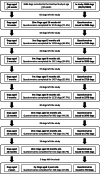'Generation Pup' - protocol for a longitudinal study of dog behaviour and health
- PMID: 33397375
- PMCID: PMC7781182
- DOI: 10.1186/s12917-020-02730-8
'Generation Pup' - protocol for a longitudinal study of dog behaviour and health
Abstract
Background: Despite extensive research, many questions remain unanswered about common problems that impact dog welfare, particularly where there are multiple contributing factors that can occur months or years before the problem becomes apparent. The Generation Pup study is the first longitudinal study of dogs that recruits pure- and mixed-breed puppies, aiming to investigate the relative influence of environmental and genetic factors on a range of health and behaviour outcomes, (including separation related behaviour, aggression to familiar/unfamiliar people or dogs and obesity). This paper describes the study protocol in detail.
Methods: Prior to commencing recruitment of puppies, the study infrastructure was developed, and subject specialists were consulted to inform data collection methodology. Questionnaire content and timepoint(s) for data collection for outcomes and potential predictors were chosen with the aim of providing the best opportunity of achieving the aims of the study, subject to time and funding constraints. Recruitment of puppies (< 16 weeks, or < 21 weeks of age if entering the United Kingdom or Republic of Ireland through quarantine) is underway. By 23 January 2020, 3726 puppies had been registered, with registration continuing until 10,000 puppies are recruited. Data collection encompasses owner-completed questionnaires issued at set timepoints throughout the dog's life, covering aspects such as training, diet, exercise, canine behaviour, preventative health care, clinical signs and veterinary intervention. Owners can elect to submit additional data (health cards completed by veterinary professionals, canine biological samples) and/or provide consent for access to veterinary clinical notes. Incidence and breed associations will be calculated for conditions for which there is currently limited information (e.g. separation related behaviour). Multivariable statistical analysis will be conducted on a range of outcomes that occur throughout different life stages, with the aim of identifying modifiable risk factors that can be used to improve canine health and welfare.
Discussion: The Generation Pup project is designed to identify associations between early-life environment, genotypic make-up and outcomes at different life stages. Modifiable risk factors can be used to improve canine health and welfare. Research collaboration with subject specialists is welcomed and already underway within the fields of orthopaedic research, epilepsy, epigenetics and canine impulsivity.
Keywords: Behaviour; Canine; Cohort; Dog; Environmental; Genetic; Health; Longitudinal; Management; Puppy.
Conflict of interest statement
J.K.M., R.A.C., R.E.P.DC, R.H.K., S. OG. and J.L.W are employed by Dogs Trust, whilst M.S.L. was also employed by Dogs Trust (2017–2019). Dogs Trust is the UK’s largest dog welfare charity with an interest in improving dog welfare (health and behaviour). The authors declare that they have no other competing interests.
Figures

References
-
- Pet Food Manufacturers’ Association. 2019. https://www.pfma.org.uk/pet-population-2019. Accessed 14 May 202.
-
- Nakano Y, Matsushima M, Nakamori A, Hiroma J, Matsuo E, Wakabayashi H, Yoshida S, Ichikawa H, Kaneko M, Mutai R, Sugiyama Y, Yoshida E, Kobayashi T. Depression and anxiety in pet owners after a diagnosis of cancer in their pets: a cross-sectional study in Japan. BMJ Open. 2019. 10.1136/bmjopen-2018-024512. - PMC - PubMed
MeSH terms
Grants and funding
LinkOut - more resources
Full Text Sources
Other Literature Sources

